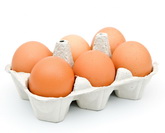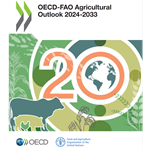
Eggs added to FDA’s updated healthy claim food list
30 December, 2024 Eggs are now officially recognized as a healthy food choice under new guidance recently released by the Food and Drug Administration (FDA).The FDA has included eggs in its updated definition of healthy claims, which it states reflects current nutrition science and dietary guidance.
According to the new definition, eggs meet the FDA’s healthy classification, which requires foods to contain a minimum number of individual nutrients. Current dietary recommendations encourage Americans to adopt healthy eating patterns that incorporate a variety of vegetables, fruits, dairy, proteins, and whole grains. Read More
USA: Table egg prices reach new record highs
24 December, 2024 Demand for shell eggs has strengthened as we approach the holiday week, with consumers finalizing their preparations. Concerns regarding tight supplies, stemming from persistent outbreaks of highly pathogenic avian influenza (HPAI) in layer flocks, are driving wholesale prices to near-record levels. Read More
Hendrix-ISA to adopt Respeggt Tech to end male chick culling in U.S.
20 December, 2024 Hendrix-ISA LLC, a global leader in animal genetics, has announced the implementation of Respeggt technology to address the controversial practice of day-old male chick culling in the poultry industry. This innovative solution provides a more ethical and sustainable option for poultry farmers in the U.S.Following careful and thorough consideration, Hendrix-ISA will integrate this cutting-edge in-ovo sexing technology into its hatchery operations in Nebraska in early Q1 2025.
The decision is based on Respeggt’s exceptional track record in Europe, particularly with the strong performance of Dekalb White genetics. “The technology will be the first in the U.S. to enable sexing for both brown and white breeds,” said Neal Martin, General Manager of Hendrix-ISA. Respeggt technology allows for the early determination of a chick's sex before hatching, thereby eliminating the need to cull male chicks - a widely debated and controversial practice. Read More
Raw milk controversy heats up
6 December, 2024 A California raw milk producer with a history of bird flu contamination recalls is being considered for a key role in the upcoming administration's raw milk policy. Mark McAfee, whose dairy products have repeatedly tested positive for the virus, has been invited to advise Robert F. Kennedy Jr.'s team on raw milk standards. Read MoreUkraine: Sharp rise in egg prices
7 November, 2024 In October, egg prices in Ukraine surged by 60%, with the cost per dozen jumping from 40-45 UAH (0.97-1.09 USD) to 50-75 UAH (1.21-1.81 USD). Producers attribute this increase to rising costs of feed, energy, and other expenses. Typically, egg prices are lowest during the spring and summer months. However, as cold weather sets in, demand rises while supply diminishes, resulting in higher prices. Additionally, production costs have escalated due to the increased price of feed. Read MoreWales/England: Mandatory bird registration coming into force soon
11 September, 2024 From 1st October 2024 it will become a legal requirement for all bird keepers in Wales and England to register themselves with the Animal and Plant Health Agency (APHA). Previously, only keepers with 50 or more birds were legally required to register. This new requirement will mean keepers of poultry and other captive birds must register regardless of the size of their flock. Read MoreImpact of egg consumption on Alzheimer’s dementia risk in seniors
31 August, 2024 A new study aims to investigates the association between egg consumption and the risk of Alzheimer's dementia (AD) among older adults. The study suggests that more frequent egg consumption is linked to a lower risk of developing Alzheimer's dementia. This relationship appears to be partially mediated by dietary choline, a nutrient abundant in eggs, which may influence AD pathology. The findings indicate that consuming more than one egg per week was associated with a 47% reduced risk of developing Alzheimer's dementia. Mediation analysis indicated that approximately 39% of the total effect of egg intake on the risk of incident Alzheimer's dementia was mediated through dietary choline, which is abundant in eggs. Read More
The OECD-FAO Agricultural Outlook for 2024-2033
22 July, 2024 A comprehensive report explores the future of agricultural commodities, highlighting trends in consumption, production, trade, and pricing over the next decade. The report outlines several key trends and impacts on the poultry industry over the Outlook period from 2024 to 2033:1. Production Growth: Global poultry production is projected to increase significantly, with a notable rise in developing countries driven by domestic demand. Global poultry meat consumption is projected to reach 160 million metric tons (MT) retail weight equivalent by 2033, accounting for half of the additional meat eaten over the period. Read More
EFSA: The use of high expansion foam for stunning and killing poultry
Scientific Opinion 17 July, 2024 The European Food Safety Authority (EFSA) was requested to perform such assessment regarding high expansion foam using nitrogen for on-farm killing of pigs and poultry. Killing of poultry and pigs using inert gases, i.e. nitrogen and argon, is an approved method but the use of high expansion foam as a vehicle to carry nitrogen and displace atmospheric air in a container and the use of nitrogen jet stream to destroy the foam and release its content to create anoxia are considered a modification of the approved method. Read MoreUSDA: $110M in meat and poultry processing to strengthen food supply chain
12 July, 2024 The Biden-Harris Administration is making investments that will strengthen American food supply chains, increase independent meat and poultry processing capacity, create more, new and better markets for producers, and lower food costs. USDA is investing nearly $110 million through the Meat and Poultry Processing Expansion Program (MPPEP) and the Local Meat Capacity (Local MCap) Grant Program.The investments are part of USDA’s efforts to create a more competitive agricultural system, advance President Biden’s Investing in America Agenda, and support the Administration’s Action Plan for a Fairer, More Competitive, and More Resilient Meat and Poultry Supply Chain, which dedicates resources to expand independent processing capacity. Together these actions help to lower food costs by spurring competition and strengthening supply chains. Read More
EU implements tariffs on Ukrainian eggs amid import surge
10 July, 2024 The European Union has imposed duties on eggs from Ukraine, activating an "automatic safeguard measure" as the volume of imports has already exceeded the agreed amount. The move is a consequence of the recent tweak – requested and obtained by France and Poland – to the temporary suspension of all tariffs and quotas on Ukraine’s agricultural exports after Russia’s full-scale invasion of the country in 2022. Read MoreWOAH Report: Antimicrobial use rises in animals
8 May, 2024 The 2021 Annual Report on Antimicrobial Agents Intended for Use in Animals was published by the World Organization for Animal Health (OIE) – encompassing 182 member states. This comprehensive report provides valuable insights into the use of antimicrobial agents in animals, including trends, analysis, and future developments.In 2021, the total amount of antimicrobial agents intended for use in animals ranged between 81,084 and 88,927 tonnes, with tetracyclines being the most used antimicrobial agent globally, accounting for 35.6% of the total amount, followed by penicillins and polypeptides.
The number of participants providing data by antimicrobial class and animal group has increased over time, with 70 participants providing detailed data for 2021. Read More
Florida bans lab-grown meat
4 May, 2024 Florida has enacted laws prohibiting and penalizing the manufacturing and distribution of cell-cultivated meat, which is produced from animal cells within a controlled facility, statewide. This legislation aligns with similar measures in three other states -Alabama, Arizona, and Tennessee -that aim to halt the commercialization of lab-grown meat. Beef production dominates Florida's agricultural landscape, with the state ranking ninth in beef cattle production in 2024, boasting a population of 862,000. Nearly half of Florida's agricultural land is allocated to cattle farming. Read More
Zoetis sells feed additive portfolio to Phibro
1 May, 2024 Zoetis and Phibro Animal Health Corporation announced that they have entered into a definitive agreement where Phibro Animal Health will acquire Zoetis’ medicated feed additive product portfolio, certain water soluble products and related assets for $350 million, subject to customary closing adjustments. This transaction is expected to be complete in the second half of calendar year 2024.The product portfolio is comprised of more than 37 product lines that are sold in approximately 80 countries and generated approximately $400 million in revenue in 2023. Read More
Dr. David Suarez honored with induction into ARS science hall of fame
USDA-ARS 30 April, 2024 he Agricultural Research Service (ARS) inducted Dr. David Suarez, Research Leader for the Exotic and Emerging Avian Viral Disease Research Unit at the U.S. National Poultry Research Center, into its Science Hall of Fame for his outstanding research on avian influenza, Newcastle disease, and emerging zoonotic viruses.ARS established the Hall of Fame program in 1986 to honor senior agency researchers for outstanding, lifelong achievements in agricultural science and technology. Nominees must be retired or eligible to retire to receive the award. Read More
Decline of 13% in U.S. poultry production and sales value
27 April, 2024 According to a new report from the USDA National Agricultural Statistics Service (NASS), the combined value of production from broilers, eggs, turkeys, and the value of sales from chickens in 2023 was $67.1 billion, down 13 percent from $77.2 billion in 2022. Of the combined total, 64 percent was from broilers, 27 percent from eggs, 10 percent from turkeys, and less than 1 percent from chickens. The value of broilers produced during 2023 was $42.6 billion, down 16 percent from 2022. The total number of broilers produced in 2023 was 9.16 billion, down slightly from 2022. Read MoreScotland considers ban on enriched egg cages
3 April, 2024 The Scottish government has initiated a consultation regarding the prohibition of colony cages, alternatively termed as "enriched cages," utilized for hens in egg production. These replaced the previous barren cages in 2012. Battery cages for birds were outlawed in the UK in the same year.However, in Scotland, over 1.1 million chickens are still housed in "enriched cages," which offer more space for nesting, roosting, and scratching compared to the smaller battery cages.
The Scottish government's inclination leans towards a ban on installing new cages starting from 2033, followed by a complete cessation of housing birds in enriched cages from 2034. The consultation additionally solicits opinions on prohibiting the use of enriched cages from 2030. Read More
USA: Egg prices are rising again
24 March, 2024 According to Nerdwallet, egg prices are once again on the upswing due to outbreaks of avian influenza. HPAI A(H5) viruses have been detected in U.S. wild aquatic birds, commercial poultry, and backyard or hobbyist flocks since January 2022, affecting more than 82 million birds across 48 states to date.Nerdwallet cited the latest Consumer Price Index, which revealed a 5.8% increase in egg prices from January to February alone. Data from the U.S. Bureau of Labor Statistics (BLS) additionally indicates that the average cost of a dozen Grade A eggs rose from $2.52 in January to $3 in February. Read More
USDA finalizes voluntary 'Product of USA' labeling rule
11 March, 2024 The U.S. Department of Agriculture (USDA) Secretary, Tom Vilsack, has announced the finalization of a rule aimed at aligning the voluntary “Product of USA” label claim with consumers' understanding of its meaning. This final rule aims to ensure that consumers can trust the authenticity of the label when they see ‘Product of USA’, knowing that every step, from birth to processing, was carried out in America.The USDA’s final “Product of USA” rule permits the voluntary use of the “Product of USA” or “Made in the USA” label claim exclusively on meat, poultry, and egg products that originate from animals born, raised, slaughtered, and processed within the United States. The rule seeks to eliminate misleading U.S. origin labeling in the market, thereby ensuring that consumers receive truthful information about the origins of their food. Read More
EU: Residues & substances in animals & products - 2022 report
EFSA 11 March, 2024 A new report summarises the monitoring data collected in 2022 on the presence of residues of veterinary medicinal products and certain substances in live animals and animal products in the EU Member States, Iceland and Norway.The main results in poultry:
For anticoccidials, 0.12% of the samples (15) analysed were non-compliant and in eggs 0.49% (28 samples). For antibacterials, six countries reported a total of 15 non-compliant samples and results. 16 non-compliant samples were reported under chemical elements (copper, cadmium, lead and zinc) by five countries. Read More
Americans to consume 1.45 billion chicken wings at Super Bowl
2 February, 2024 As per the National Chicken Council's 2024 Wing Report, Americans are expected to consume 1.45 billion wings while watching the Kansas City and San Francisco championship game.This year's estimate remains steady compared to 2023, attributed to slightly lower chicken production levels and a 13% decrease in wing stocks in cold storage reported by the USDA in November compared to the previous year. This could account for the heightened demand and subsequent increase in wholesale wing prices. Read More










